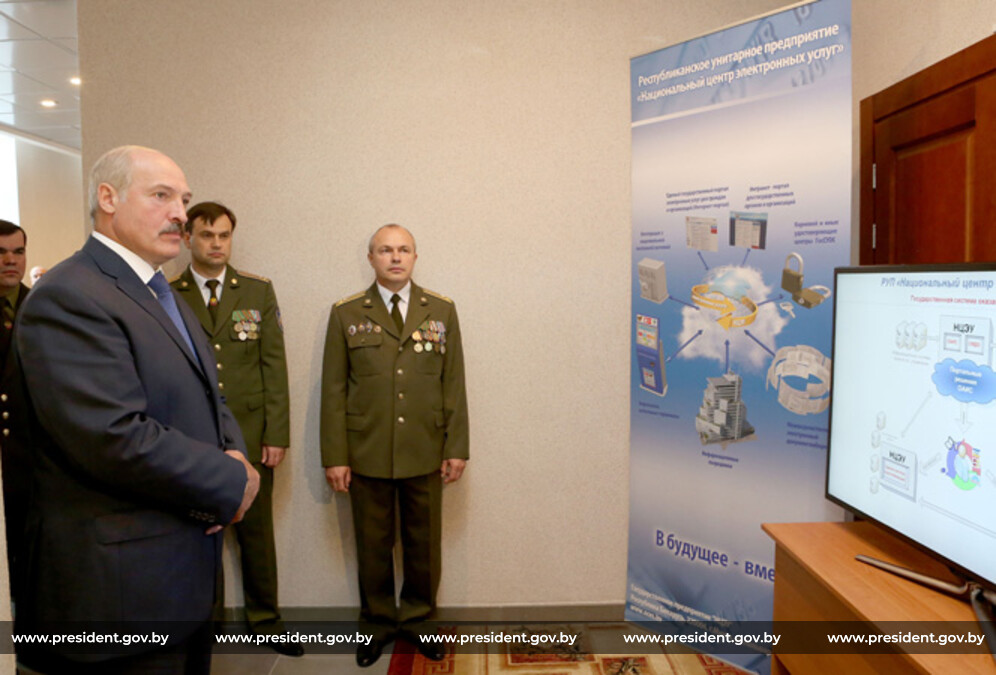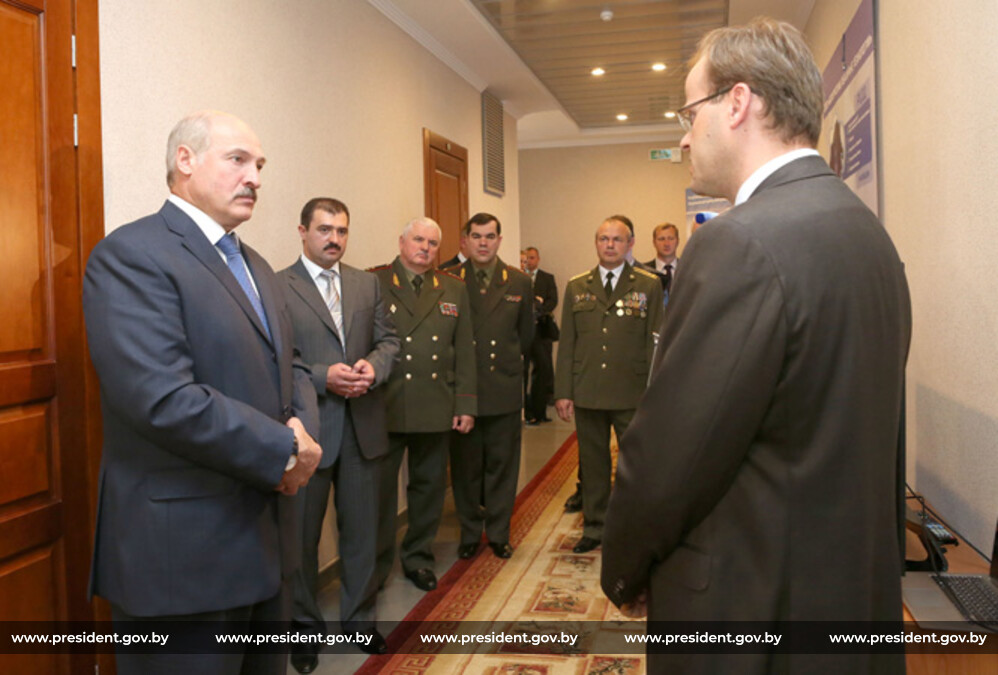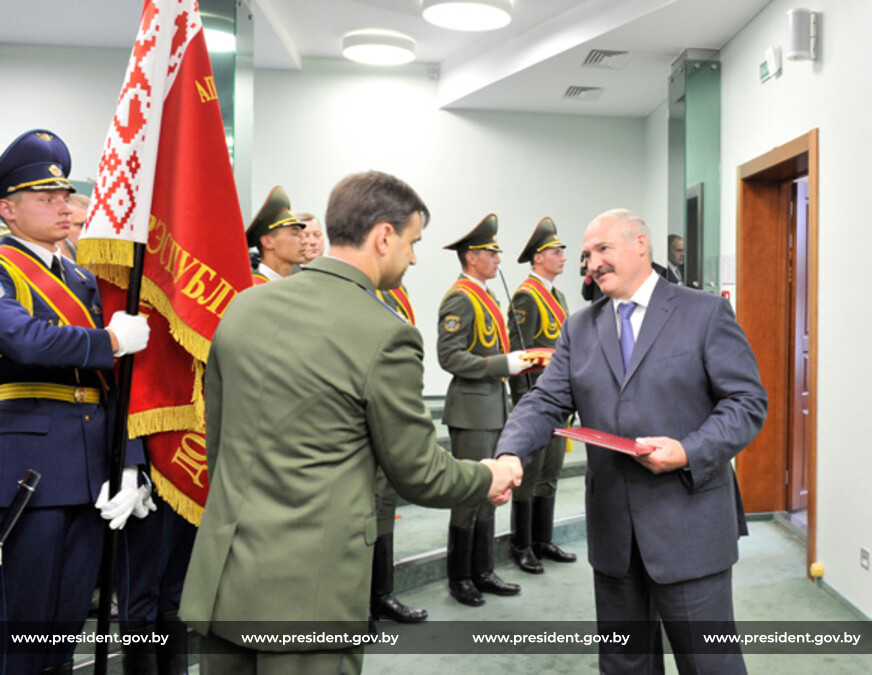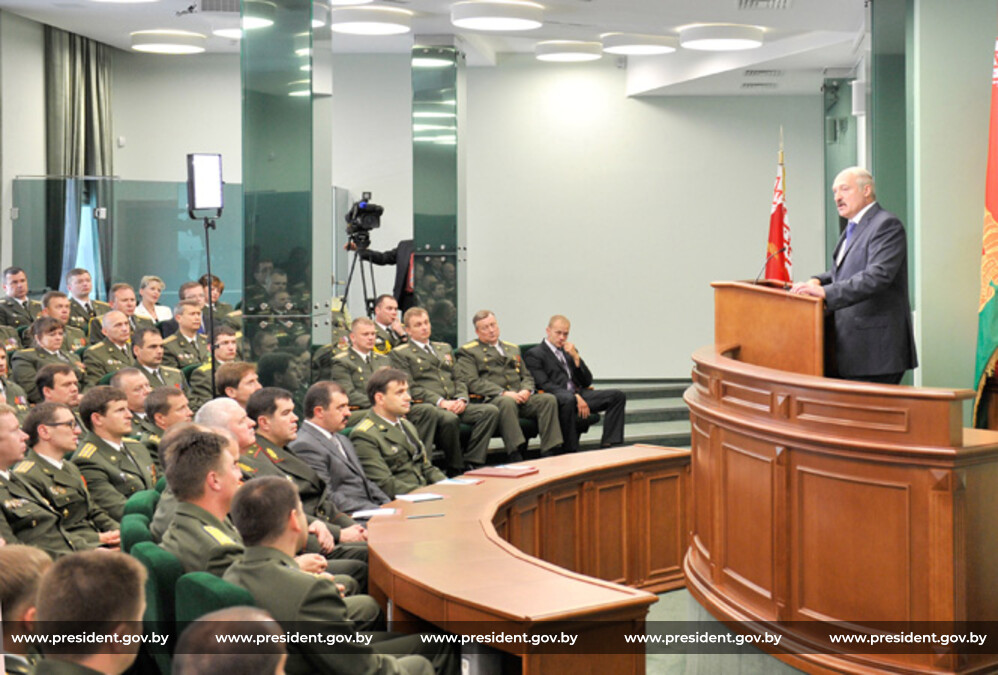Aleksandr Lukashenko visits Operational and Analytical Center
- 6
The Operational and AnalyticalCenter under the Aegis of the President of the Republic of Belarus (OAC) should intensify work across all its activities, President of Belarus Aleksandr Lukashenko said as he paid a visit to the center on 7 June.
The head of state remarked that the decision to establish the OAC five years ago was necessitated by the situation in the country. “New challenges and threats associated first of all with the fight against corruption in the top echelons of power and the need to maintain information security of the state required creating an intellectually strong, mobile think tank that would not depend on corporate interests and external pressure”, the President said.
According to Aleksandr Lukashenko, the OAC was to keep its finger on the pulse of the country, provide the President with absolutely objective analysis and forecasts, promptly identify problems threatening the national security, economic and social stability and put forward specific proposals to address them. “Thanks to the courage, integrity and professionalism of the center’s staff, a number of executives that ran afoul of the law, got stuck in red tape and fraud could see that there are no untouchable people in Belarus,” the head of state said.
“Many of our fellow citizens take the Operational and AnalyticalCenter as the last resort hoping it will help them restore justice and resolve their problems. For me, it is one of the biggest and most convincing testaments to the efficiency of your work. Today the center has occupied its niche in the system of government agencies of Belarus. It succeeds in performing its tasks and functions related to investigative activities, state control of information security and information and communication technology,” the President said.
“Thanks largely to the work of the OAC specialists Belarus has recently climbed up in the world’s information society development rankings. You have been successfully implementing a big investment project. One of its results was the development of a high-speed transcontinental communication main between Moscow and Frankfurt,” Aleksandr Lukashenko said.
“You have initiated this and other projects. You have a national approach to the matter. You should not, however, get complacent as you will be outraced the moment you stop. You should do you level best to surpass the world giants who have huge opportunities for the development of the areas that come within your purview,” the President stressed.
“Apart from that, you must be prepared to counteract threats to information security. In the recent past, the OAC jointly with other agencies put a stop to the attempts to rock the political boat with the help of the Internet. I am sure that you will continue to give a decent response to such provocations,” Aleksandr Lukashenko stated.
"The mission of the center and other security agencies is to protect our state and our people," the Belarusian President added.
“Enjoying a high reputation and President’s support, the OAC should intensify work across all its activities,” the head of state said. “I want you to provide more complete and high-quality information about efforts to combat corruption, about the situation in the economy and in individual strategic sectors and specific companies. You should keep track of everything that concerns our state and that cannot be ignored,” the President remarked.
Aleksandr Lukashenko presented a banner to the Operational and AnalyticalCenter. The banner will serve as a symbol of honor, valor and glory, a reminder of the sacred duty to defend the Fatherland.
“The banner presented to the Operational and AnalyticalCenter is the acknowledgement of its high status as a government agency responsible for the national security. Over the five years since it was established, the center has made extraordinary progress and has demonstrated great professionalism in addressing a variety of challenges. The center’s personnel are courageous and honest people who are devoted to what they do and who always justify the trust put in them,” the President wrote in his message to the OAC.
“You have no right to fail. This should be the most honest, faultless and fair agency of our country,” Aleksandr Lukashenko said addressing the staff of the center.
While visiting the OAC, the President was informed about the operation of the government agency and was made familiar with the operation of the enterprises run by the OAC. In particular, those include the national centers for digital services and data peering, the research and development institute for technical information protection, and SOOO Belarusian Cloud Technologies (beCloud).
According to Director of the NationalCenter for Digital Services Andrei Ilyin, the enterprise operates interagency information systems and renders digital services to corporations and individuals using these systems. Enabling interagency communication based on electronic document management is another facet of the center’s operation.
The operation of the enterprise is aimed at effective formation and development of the state system for rendering digital services. The enterprise works to minimize the time spent on personal contacts between citizens and government agencies. “Within the next two years we intend to upgrade most of the services available in the country to a level where only one visit to a government agency or no visit at all is required,” Andrei Ilyin noted.
In turn, the NationalCenter for Data Peering enables quality provision of the said services to the nation by means of highly advanced broadband data networks.
According to the center’s director Nikolai Kochkin, the enterprise is focused on creating a universal nationwide data network, protection against unauthorized access, technical control over international traffic throughput, the deployment of data centers and points to access international networks. “The achievement of these goals will allow creating a modern data transfer infrastructure in Belarus, introducing the latest technologies, attracting investments into the telecommunication industry, and enabling high quality service,” Nikolai Kochkin said.
Nikolai Kochkin said that the total length of fiber optic lines in Belarus exceeds 30,000km. “They make up a good vast infrastructure created by various economic operators. Unfortunately, it is not used effectively everywhere, particularly in regional networks,” the official remarked.
“By exploiting the favorable geographical location of the country on the way of information flows from Asia to Europe we intend to create new points to connect to international operators for the sake of attracting transit traffic,” Nikolai Kochkin said.
The construction of the high-speed data line Moscow-Minsk-Frankfurt is the first project implemented to that goal. Since the line is in the ground all the way, an emergency can be fixed within four hours at most. Meanwhile, the signal transmission time is considerably lower than that offered by alternative lines. The bandwidth of the line is 1.2Tbps and can be upgraded up to 8Tbps.
“The testing of the line has been completed and in the near future the line will be available for commercial operation. After securing points of presence in Moscow and Frankfurt we will be able to arrange other projects, too. For instance, it is possible to connect to over 200 international operators in Frankfurt. It will allow providing traffic transit, Internet access services, telematics services,” Nikolai Kochkin said.
The President was informed that foreign investments had been used to create a national data processing center and build the universal data network. In particular, the joint venture Belarusian Cloud Technologies has been created. The company is implementing this project and a number of other ones. Director General of the company Sergei Poblaguyev informed about them in detail.
“We plan to create the first infrastructure operator, which emergence will greatly stimulate the market of cloud technologies and telecommunication technologies on the whole, will improve the foundation for developing a digital economy,” he remarked.
According to Sergei Poblaguyev, the project is expected to save a lot of public money in the implementation of information and communication projects. It will rule out redundancy in buying equipment. The information and communication technologies development index will grow larger thanks to higher major indicators such as the availability of services. The project’s total budget is close to $400 million.
Aleksandr Lukashenko spoke in glowing terms about the efforts in these areas. The
President gave instructions to continue implementing these projects and other
ones, which encourage the advance of information and communication technologies
in Belarus.











